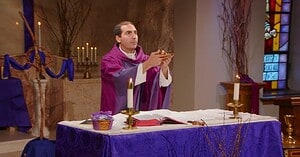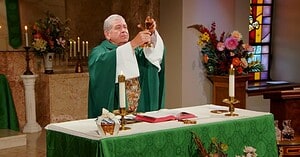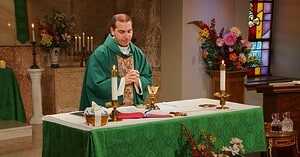Twenty-Ninth Sunday in Ordinary Time
Homily Video
Twenty-Ninth Sunday in Ordinary Time Homily Transcript
So when Jesus rose from the dead and is appearing to the apostles, he’s trying to explain to them how his suffering and death was part of the plan of God, plan of the scriptures. So he, like we hear on the road to Umaus with the disciples, he opens their minds to understand the scriptures.
Well, one of the things he’s revealing to them helping to understand is like our first reading here from Isaiah. “The lord is pleased to crush him in his infirmity.” So when Christ is hanging on the cross and the Sanhedrin and the elders and the crowd are mocking him, they say, “Come down, if you’re truly the messiah, the son of God, Come down from the cross right now.” Christ doesn’t do it because again, this is part of his plan, part of God’s plan as revealed in the scriptures that the son of God would be, like Isaiah said, this suffering servant, the one who’s going to give his life as a ransom for many. Not one who’s going to grasp for life and health and power, but who’s going to pour himself out.
And then this is what the letter to the Hebrews is saying. This is what our high priest does. He doesn’t shed the blood of some bull or some goat or calf or whatever. He sheds his own blood to forgive our sins, to give us life, to open the gates of heaven for us.
Okay, so anyways, shedding one’s blood, giving yourself away.
When James and John make this request to the lord, “Hey, can we sit at your right and your left?” They’re not bad guys, I mean they go on to be saints, but they’re mistaken. And Jesus has to, he has to teach them here. This is a significant teaching moment in their ministry and they’re going to learn from this, that loving God and being privileged or chosen by God isn’t like a position of wealth and power and grandeur and whatnot. It’s giving yourself away, it’s serving. And not just for like disciples In the church or priests or whatever, but for all of us as Christians,
We’re not called just to serve ourselves.
We don’t wake up in the morning thinking, “Okay, what do I need to do today?” We’re not, we’re not, at least if we live as self-absorbed people, that’s not what’s going to bring us happiness, but to really trust that if we give ourselves away, God will bless us in return. And never doubt that, right? We can be generous. We can, you know, again be merciful in forgiving someone. Give your money away, hey, give it to Mercy Home, whatever. But God will provide, okay?
So you never have to worry about that and serve one another. That’s what Jesus does. That’s when we receive life. So real quick, just a little, you know, kind of story here. You know, I have a school at St. Paul of the Cross. It’s a great school and, you know, the kids are always asking me, you know, like, “Father James, what’s your favorite color? What’s your favorite, you know, sport? What’s your favorite book?” So you know, they’re always asking me, like, “What my favorite animal is?” Things like that, right? So, “what’s your favorite pastime?”A nd I always tell them, “I’m making fun of Father Scott on Mercy Home masses. That’s my favorite hobby.”
But someone asked me the other day, actually, “What’s your favorite bird?” Which is kind of random. Favorite bird? I was like, “whatever.” And I had to think about that. I was like, “you know what? I do have a favorite bird, actually.” My favorite bird is, this is going to sound really random, my favorite bird is the pelican. Now there’s a reason for this. If you go into some catholic churches, often you will see a pelican, pelican like on the altar in particular.
So, like, where I grew up, my home parish, Saints Faith, Hope, and Charity; in Winnetka. If you ever look at the altar there, there’s a pelican. Or the parish where I was previously a pastor of at St. Juliana in Chicago, one of the stained glass windows has a pelican. Well, the pelican represents the eucharist because the tradition to have it is when a pelican is in the wilderness and it can’t get fish to feed its young, what the mother pelican does is with its long beak, it stabs itself and it feeds its little chicks with its blood.
So, again, the pelican is an image of the eucharist. So, Christ feeding us with his blood like those birds do. Now, what’s cool also about the pelican is just in a recent Chicago tribune article, you know, pelicans, we usually think of like easy living down the Gulf Coast or Florida or whatever on a dock, but pelicans have actually been spotted in Chicago.
There’s a variety of reasons for that. Maybe there’s an abundance of Asian carp that they’re eating, whatever, warmer weather. But the fact is, like, the fact that the pelican is spotted now in Chicago, these birds are migrating south for the winter, but they’re stopping here. We too, here in Chicago, are called to be like those birds, to be like Jesus Christ, to not look to be served, but to serve, to give our blood, to give our lives as a ransom for many.
Amen.
Readings
Featured Text
Discover More
First Sunday of Lent
February 22, 2026
Sixth Sunday in Ordinary Time
February 15, 2026
Fifth Sunday in Ordinary Time
February 8, 2026
Request Sunday Mass Guide
The Sunday Mass Guide sent to your home address
Spiritual nourishment and updates from the Sunday Mass community
Monthly reflections from Fr. Scott Donahue, our Principal Celebrant


